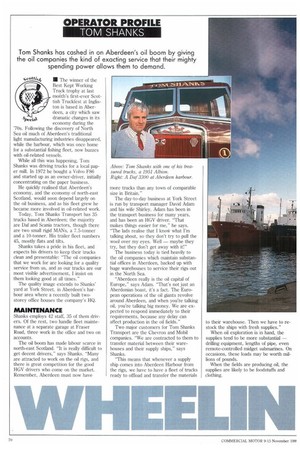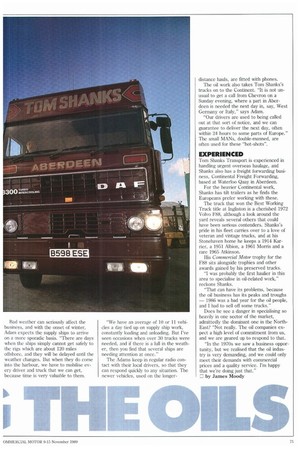Tom Shanks has cashed in on Aberdeen's oil boom by
Page 72

Page 73

If you've noticed an error in this article please click here to report it so we can fix it.
giving the oil companies the kind of exacting service that their mighty spending power allows them to demand.
• The winner of the Best Kept Working Truck trophy at last month's first-ever Scottish Truckfest at Ingliston is based in Aberdeen, a city which saw 8Peci dramatic changes in its economy during the '70s. Following the discovery of North Sea oil much of Aberdeen's traditional light manufacturing industries disappeared, while the harbour, which was once home for a substantial fishing fleet, now buzzes with oil-related vessels.
While all this was happening, Tom Shanks was driving trucks for a local paper mill. In 1972 he bought a Volvo F86 and started up as an owner-driver, initially concentrating on the paper business.
He quickly realised that Aberdeen's economy, and the economy of north-east Scotland, would soon depend largely on the oil business, and as his fleet grew he became more involved in oil-related work.
Today, Tom Shanks Transport has 35 trucks based in Aberdeen; the majority are Daf and Scania tractors, though there are two small rigid MANs, a 7.5-tonner and a 10-tonner. His trailer fleet numbers 45, mostly flats and tilts.
Shanks takes a pride in his fleet, and expects his drivers to keep their trucks clean and presentable: "The oil companies that we work for are looking for a quality service from us, and as our trucks are our most visible advertisement, I insist on them looking good at all times."
The quality image extends to Shanks' yard at York Street, in Aberdeen's harbour area where a recently built twostorey office houses the company's HQ.
MAINTENANCE
Shanks employs 42 staff, 35 of them drivers. Of the rest, two handle fleet maintenance at a separate garage at Fraser Road, three work in the office and two on accounts.
The oil boom has made labour scarce in north-east Scotland. "It is really difficult to get decent drivers," says Shanks. "Many are attracted to work on the oil rigs, and there is great competition for the good HGV drivers who come on the market. Remember, Aberdeen must now have more trucks than any town of comparable size in Britain."
The day-to-day business at York Street is run by transport manager David Adam and his wife Shirley. Adam has been in the transport business for many years, and has been an HGV driver. "That makes things easier for me," he says. "The lads realise that I kno* what I'm talking about, so they don't try to pull the wool over my eyes. Well — maybe they try, but they don't get away with it!"
The business today is tied heavily to the oil companies which maintain substantial offices in Aberdeen, backed up with huge warehouses to service their rigs out in the North Sea.
"Aberdeen really is the oil capital of Europe," says Adam. "That's not just an Aberdonian boast, it's a fact. The European operations of the oil giants revolve around Aberdeen, and when you're talking oil, you're talking big money. We are expected to respond immediately to their requirements, because any delay can affect production in the oil fields."
Two major customers for Tom Shanks Transport are the Chevron and Mobil companies. "We are contracted to them to transfer material between their warehouses and their supply ships," says Shanks.
"This means that whenever a supply ship comes into Aberdeen Harbour from the rigs, we have to have a fleet of trucks ready to offload and transfer the materials to their warehouse. Then we have to restock the ships with fresh supplies."
When oil exploration is in hand, the supplies tend to be more substantial — drilling equipment, lengths of pipe, even remote-controlled midget submarines. On occasions, these loads may be worth millions of pounds.
When the fields are producing oil, the supplies are likely to be foodstuffs and clothing. Had weather can seriously affect the business, and with the onset of winter, Adam expects the supply ships to arrive on a more sporadic basis. "There are days when the ships simply cannot get safely to the rigs which are about 120 miles offshore, and they will be delayed until the weather changes. But when they do come into the harbour, we have to mobilise every driver and truck that we can get, because time is very valuable to them. "We have an average of 10 or 11 vehicles a day tied up on supply ship work, constantly loading and unloading. But I've seen occasions when over 30 trucks were needed, and if there is a lull in the weather, then you find that several ships are needing attention at once."
The Adams keep in regular radio contact with their local drivers, so that they can respond quickly to any situation. The newer vehicles, used on the longer distance hauls, are fitted with phones.
The oil work also takes Tom Shanks's trucks on to the Continent. "It is not unusual to get a call from Chevron on a Sunday evening, where a part in Aberdeen is needed the next day in, say, West Germany or Italy," says Adam.
Our drivers are used to being called out at that sort of notice, and we can guarantee to deliver the next day, often within 24 hours to some parts of Europe." The small MANs, double-manned, are often used for these "hot-shots".
EXPERIENCED
Tom Shanks Transport is experienced in handling urgent overseas haulage, and Shanks also has a freight forwarding business, Continental Freight Forwarding, based at Waterloo Quay in Aberdeen.
For the heavier Continental work, Shanks has tilt trailers as he finds the Europeans prefer working with these.
The truck that won the Best Working Truck title at Ingliston is a cherished 1972 Volvo F88, although a look around the yard reveals several others that could have been serious contenders. Shanks's pride in his fleet carries over to a love of veteran and vintage trucks, and at his Stonehaven home he keeps a 1914 'Carrier, a 1951 Albion, a 1961 Morris and a rare 1965 Atkinson.
His Commercial Motor trophy for the F88 sits alongside trophies and other awards gained by his preserved trucks.
"1 was probably the first haulier in this area to specialise in oil-related work," reckons Shanks.
"That can have its problems, because the oil business has its peaks and troughs — 1986 was a bad year for the oil people, and I had to sell off some trucks."
Does he see a danger in specialising so heavily in one sector of the market, admittedly the dominant one in the NorthEast? "Not really. The oil companies expect a high level of commitment from us, and we are geared up to respond to that.
"In the 1970s we saw a business opportunity, but we realised that the oil industry is very demanding, and we could only meet their demands with commercial prices and a quality service. I'm happy that we're doing just that."
E by James Moody




























































































































